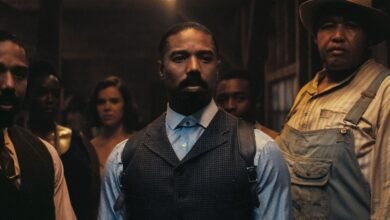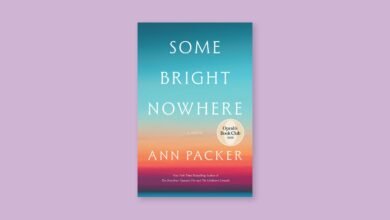
The Academy of Motion Picture Arts and Sciences announced on Wednesday that, because of the devastating wildfires raging in and around Los Angeles, the Oscar-voting deadline would be extended by two days. Nomination ballots, previously due Sunday, January 12th, can now be turned in up until Tuesday, January 14th; the announcement of the nominations, originally scheduled for Friday, January 17th, will now take place on Sunday, January 19th. The news was accompanied by a flurry of postponements and cancellations across the pre-Oscars circuit. As plans for January premières, luncheons, and awards shows were upended, we were treated to an almost moralistic spectacle of Tinseltown frivolities colliding with the elemental dictates of Mother Nature. And why not? In California, the twin annual scourges of awards season and wildfire season, both driven by gusts of hot air, have been steadily lengthening to the point where each can be considered a year-round event.
The Academy has tended to respond to major disasters with an unflappability—some would say an inflexibility—rooted in its own staggering self-importance. During the pandemic, when all other awards shows for the 2020-21 season were either cancelled or relegated to Zoom, the Academy spent millions on a scaled-down but still lavish in-person ceremony, with enough COVID-19 safety protocols in place to insure that guests could take off their face masks while the cameras were rolling. The message was clear: the show must go on, but only on the Academy’s terms. In this light, it’s hard to reconcile the inarguable logic of the Academy’s brief deadline extension with a certain ghastly absurdity. For voters harmed by the wildfires to any degree, would two days really make a difference? Would an evacuee wondering if her home is still standing really choose this moment to finally pop in that screener of “Conclave,” head out in search of a theatre showing “The Brutalist,” or try to remember if she saw “Gladiator II”?
Or maybe she would. The movies are my escape as well as my professional concern, and the process of watching and thinking and writing about movies has been my own welcome distraction through many a difficult stretch, if seldom one as difficult as this. I spent much of my own wildfire evacuation, on Wednesday, anxiously awaiting reports of fire damage in my home city of Pasadena and, when the news became too heavy, putting the finishing touches on my own fantasy Oscar ballot, which follows below. If I voted on the Academy Awards—and like any critic, I don’t—here are the films, directors, performances, and screenplays I would nominate in eight of this year’s categories. All nominees are listed in alphabetical order, with my preferred winner in boldface. As with all matters and activities related to awards-giving and list-making, I regard this as an exercise more whimsical than rigorous. My own choices would likely change a dozen times well before ballots are due, and I wish all voters the pleasure of puzzling over their own favorites in the tough days ahead.
Best Picture
“All We Imagine as Light”
“Anora”
“The Brutalist”
“Close Your Eyes”
“A Different Man”
“Do Not Expect Too Much from the End of the World”
“Evil Does Not Exist”
“Green Border”
“La Chimera”
“Nickel Boys”
The Academy’s efforts to diversify its membership have made it a more international organization than it was several years ago, and that shift has been gratifyingly evident in the rising number of non-English-language films nominated for Best Picture. It’s hard to imagine the membership of a decade earlier nominating either the Japanese drama “Drive My Car” (2021) or the predominantly German- and Polish-language drama “The Zone of Interest” (2023) in this category, much less naming the South Korean thriller “Parasite” the best movie of its year (2019). Encouraging as all this may be, it’s still nowhere near enough, and, sadly, a regression appears likely this year. The only picture from overseas likely to crack Best Picture is Jacques Audiard’s popular yet polarizing “Emilia Pérez,” a French-produced, Spanish-language, trans-themed musical crime thriller that recently won Golden Globe awards for Best Motion Picture – Musical or Comedy and Best Motion Picture – Non-English Language.
“Emilia Pérez” wouldn’t make my list, but I’d feel better about its inclusion if it weren’t the only import in the race—if it were joined, say, by “All We Imagine as Light,” a shimmeringly perceptive drama from the Indian director Payal Kapadia, or Ryûsuke Hamaguchi’s ominous eco-drama, “Evil Does Not Exist,” which ideally would have commanded as much critical and industry attention as its director’s previous masterwork, “Drive My Car.”
Most of the other eight titles on my personal Best Picture ballot also appeared on my 2024 year-end list. The fact that most of them will go unseen by Academy members strikes me as more of a reason, not less, to make a case for them here. The films include the haunting and elegiac Spanish cine-mystery “Close Your Eyes”; the explosively funny Romanian road movie “Do Not Expect Too Much from the End of the World”; the bleak yet bracing refugee drama “Green Border”; and “La Chimera,” a magical archeological fable, set under the Tuscan sun (and sand and soil). Likelier to land on voters’ radars, by dint of their critical acclaim and Stateside pedigree, are “Nickel Boys,” a remarkable adaptation of Colson Whitehead’s novel, and “A Different Man,” a labyrinthine dark comedy about masks and identities, art and artifice. I’m also adding “Anora” and “The Brutalist,” two critical favorites that narrowly missed my list. Both are thrilling signs of life for an independent, deeply personal American cinema, and both are accomplished enough to stake a place in the Best Picture conversation.
Best Director
Víctor Erice, “Close Your Eyes”
Agnieszka Holland, “Green Border”
Radu Jude, “Do Not Expect Too Much from the End of the World”
Payal Kapadia, “All We Imagine as Light”
RaMell Ross, “Nickel Boys”
One of the formal strengths of Kapadia’s fiction feature début, “All We Imagine as Light,” is that it seamlessly merges a dramatic narrative with swatches of documentary realism—an exquisite touch that harks back to Kapadia’s previous film, the fiction-nonfiction hybrid “A Night of Knowing Nothing” (2021). Ross’s achievement is an equivalent one, but it’s also sui generis; his previous film, the Oscar-nominated “Hale County This Morning, This Evening” (2018), is one of the great lyric works of recent nonfiction cinema, and “Nickel Boys” is no less thrilling in its poetic, inventive play with film language. And then there’s Jude, whose formally rambunctious comedies tend to upend conventional notions of fiction and nonfiction to begin with; his latest, the gleefully mercurial “Do Not Expect Too Much from the End of the World,” is no exception.
The Best Director category often pits gifted upstarts—like Brady Corbet (“The Brutalist”), who, at thirty-six, is the youngest of this year’s plausible hopefuls—against more venerated talents, Steven Spielberg and Martin Scorsese not infrequently among them. This year, I’d put forth the seventy-six-year-old Holland, who, apart from a Best Adapted Screenplay nomination for “Europa, Europa” (1990), has never got her due from the Academy. A nomination for “Green Border,” which stands easily among her best work, would honor a career defined by its fearless humanism and political advocacy. My other veteran favorite is the eighty-one-year-old Erice, whose “Close Your Eyes” was the most emotionally overwhelming experience I had in a movie theatre last year. It’s the work of a world-cinema legend, reckoning with a decades-spanning career that has seen disappointing setbacks and unrealized dreams. To give Erice a career-first Oscar nomination for Best Director would acknowledge—and attempt to reverse—some of those disappointments.
Best Actress
Marianne Jean-Baptiste, “Hard Truths”
Mikey Madison, “Anora”
Ilinca Manolache, “Do Not Expect Too Much from the End of the World”
Julianne Nicholson, “Janet Planet”
Fernanda Torres, “I’m Still Here”
In 1997, Jean-Baptiste became the first Black British woman to receive an Oscar nomination for acting—an honor bestowed on her quietly graceful work in Mike Leigh’s “Secrets & Lies.” Nearly thirty years later, she’s likely to receive her second nomination, for Leigh’s latest film, “Hard Truths,” in which she gives a furious, funny, ultimately devastating performance as a woman in the grip of a profound misery. It’s already earned her accolades from several critics’ groups (two of which, the Los Angeles Film Critics Association and the National Society of Film Critics, I’m a member of), and it should push her to the fore of this category on merit alone. But critical acclaim only fitfully translates into an Academy embrace, which is why some of the year’s other great actresses stand even less of a chance: Manolache is electrifying as a harried production assistant and renegade TikTok personality in “Do Not Expect Too Much from the End of the World,” while Nicholson, befitting the title role of “Janet Planet,” exerts a near-gravitational pull on everyone around her, the audience included.
Happily, Madison remains a strong possibility for her star-making turn, in “Anora,” as a Brooklyn stripper grabbing a Cinderella fantasy by the horns. Torres, the superb Brazilian star of Walter Salles’s mournful political drama “I’m Still Here,” faces more of an uphill battle, although she’ll doubtless get a boost from her Golden Globe win for Best Performance by a Female Actor in a Motion Picture – Drama, for which she beat out starrier hopefuls like Angelina Jolie (“Maria”), Nicole Kidman (“Babygirl”), and Tilda Swinton (“The Room Next Door”). In mentioning the Globes, though, I’d be remiss not to note the sudden ascendancy of Demi Moore, whose sensational body-horror showcase in “The Substance” earned her the prize for Best Performance by a Female Actor in a Motion Picture – Musical or Comedy. In a moving acceptance speech, Moore perfectly articulated the career-long struggles with Hollywood misogyny and personal self-doubt that give “The Substance” its particular meta-oomph. At this point, she has to be considered a more-than-plausible front-runner for a performance that, if not the best in contention, is undoubtedly the most industry-resonant.
Best Actor
Adrien Brody, “The Brutalist”
Source link







